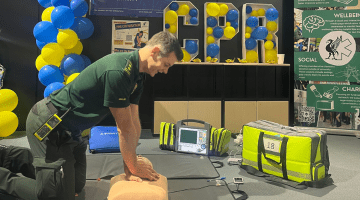Course modules
Discover the building blocks of your programme
Further guidance on modules
Modules are designated core or optional in accordance with professional body requirements, as applicable, and LJMU’s Academic Framework Regulations. Whilst you are required to study core modules, optional modules provide you with an element of choice. Their availability may vary and will be subject to meeting minimum student numbers.
Where changes to modules are necessary these will be communicated as appropriate.
Core modules
Advancing Public Health, Evidence based Practice and Application
20 credits
20 credits
This module aims to provide you with the knowledge and skills to work as a public health practitioner in the community setting within your field of practice.
It introduces the discipline of public health and the use of evidence to improve services. You will also learn how public policy can influence health needs and service development. The wider determinants of health and health inequalities will be examined in detail. Principles and concepts of health promotion will also be covered.
Clinical Assessment and Decision Making
20 credits
20 credits
Module content will include:
- History taking and holistic assessment of physical and mental health,
- Advanced communication skills,
- Pathophysiology,
- Physical examination,
- Interpretation of routine diagnostic investigations
- Clinical decision making incorporating therapeutic interventions.
- Safe, high quality and evidence based patient-centred care
- Typical and complex patient presentations
- Clinical judgement, risk and referrals
- Differential diagnosis
- Therapeutic and person-centred approaches
Advancing Leadership and Management
20 credits
20 credits
This module aims to enhance your skills and knowledge, enabling you to take a central role in the development of practice within your working environment.
It will also provide an opportunity for you to engage in debate and discussion, so you can identify your strengths and weaknesses as a leader within your organisation.
You will further consider how you can influence and inspire others at both a local, regional, national and international level.
Advancing Specialist Practice Qualification; District Nursing.
40 credits
40 credits
To help the student to maximise learning opportunities and experiences within their practice field. There is a necessity for the learner to be exposed to wider, complex issues within the community and how to strategically plan for care delivery.
Optional Modules
Negotiated work-based learning
20 credits
20 credits
To enable SPQ students to maximise learning opportunities and experiences relevant to their own area of work in order to facilitate practice, career and professional development
Independent and Supplementary Prescribing
20 credits
20 credits
Aimed at healthcare professionals registered with the HCPC & NMC, this module enables you to prescribe, safely, appropriately and cost-effectively as independent and/or supplementary prescribers, in accordance with both legal and professional requirements.
The module will prepare you to:
- complete an assessment of a patient/client/service users whilst developing a management plan in relation to their diagnosis/differential diagnosis.
- complete an episode of care through prescribing or deprescribing safety
All students who wish to undertake Independent & Supplementary Prescribing also known as V300 Non-Medical Prescribing will have to complete an additional 'North West Non-Medical Prescribing Application form' which will be approved by the prescribing programme team prior to commencement on the independent and supplementary prescribing programme.
Course tutors

Conleth Kelly
Featured tutors job title
-
 Lecturer/Senior Lecturer
Lecturer/Senior Lecturer -
 Lecturer/Senior Lecturer
Lecturer/Senior Lecturer -

Career paths
Further your career prospects
LJMU has an excellent employability record with 96% (HESA 2018) of our postgraduates in work or further study six months after graduation. Our applied learning techniques and strong industry connections ensure our students are fully prepared for the workplace on graduation and understand how to apply their knowledge in a real world context.
Tuition fees and funding
- Full-time per year:
- £8,750
Entry requirements
You will need:
Qualification requirements
Undergraduate degree
In a relevant nursing subject
Consideration will be given to applicants who evidence of successful Level 6 or Level 7
(within the last 5 years)
GCSEs and equivalents
GCSE/Equivalent Grade C or above in Maths and English
Additional requirements
-
Relevant work experience
Must be registered as an Adult Nurse on the NMC Register, with a minimum of 1 year post registration experience
-
Interview required
An interview will be conducted involving the prospective learner and the employer prior to offering a place on the programme
Further information
-
Extra Requirements
Please note: Students wishing to undertake the V300 element of this programme must also be deemed competent by, and obtain permission and support from their employer. All students who wish to undertake V300 Non-Medical Prescribing will have to complete an additional 'North West Non-Medical Prescribing Application form' which will be approved by the prescribing programme team prior to commencement on the NMP programme.
Registered nurse (level 1) with relevant professional registration
Please Note: All international qualifications are subject to a qualification equivalency check.
How to apply
Securing your place at LJMU
Your university life
From accommodation and academic support to clubs and societies. Find out what LJMU has to offer.
Related Links
Talk to our students
Connect with a current LJMU student for advice and guidance on university life, courses and more.
See what our students are saying
At LJMU we want you to know you’re making the right choice by studying with us. You can see what our students are saying about their experience with us through their reviews on the following websites:
Related Links
News and views
Browse through the latest news and stories from the university

.png)








The University reserves the right to withdraw or make alterations to a course and facilities if necessary; this may be because such changes are deemed to be beneficial to students, are minor in nature and unlikely to impact negatively upon students or become necessary due to circumstances beyond the control of the University. Where this does happen, the University operates a policy of consultation, advice and support to all enrolled students affected by the proposed change to their course or module.















